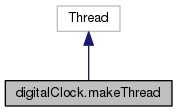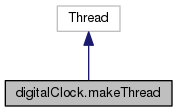 |
Python_2
1.0
|
 |
Python_2
1.0
|
Creates a new thread. More...


Public Member Functions | |
| def | __init__ (self, func) |
| Constructor. More... | |
| def | __del__ (self) |
| Object destructor. More... | |
| def | run (self) |
| Method representing the thread's activity. More... | |
Public Attributes | |
| debug | |
Private Attributes | |
| __action | |
Creates a new thread.
Creates a thread.
| def digitalClock.makeThread.__init__ | ( | self, | |
| func | |||
| ) |
Constructor.
| func | function to be executed in this thread. |
| def digitalClock.makeThread.__del__ | ( | self | ) |
Object destructor.
In Python, destructors are needed much less, because Python has a garbage collector that handles memory management. However, there are other resources to be dealt with, such as: sockets and database connections to be closed, files, buffers and caches to be flushed.
References _07_alarme_class.alarm.debug, _08b_clock_bezier.makeThread.debug, _08c_clock.makeThread.debug, _08c_clock.clock.debug, and digitalClock.makeThread.debug.
| def digitalClock.makeThread.run | ( | self | ) |
Method representing the thread's activity.
This method may be overridden in a subclass.
References _07_alarme_class.alarm.makeThread.__action, _08b_clock_bezier.makeThread.__action, _08c_clock.makeThread.__action, digitalClock.makeThread.__action, _07_alarme_class.alarm.debug, _08b_clock_bezier.makeThread.debug, _08c_clock.makeThread.debug, _08c_clock.clock.debug, and digitalClock.makeThread.debug.
|
private |
Referenced by digitalClock.makeThread.run().
| digitalClock.makeThread.debug |
Referenced by digitalClock.makeThread.__del__(), and digitalClock.makeThread.run().